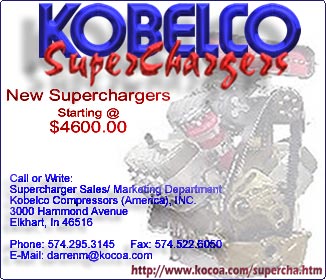|
<<
PREVIOUS PAGE
DRO: Can you comment
on the departure of Top Fuel Harley from the
IHRA mix? Was that a sponsorship issue?
Polburn: Yes,
that's exactly what it was. The class was essentially
funded by the Harley-Davidson Motorcycle Company
and the Screamin' Eagle brand, and everything
was going
ADVERTISEMENT
 |
fine,
but the bottom line, just as all these other
companies are having economic problems, so did
they and they needed to find some cash and said
that they were not going to renew the program.
So it's pretty simple; if you don't have the
funds to renew the program, you don't have the
funds.
So, we went out and scrambled to find other
sponsors to pick up the class, but were unsuccessful
in doing that. And again, did it slam the door
on the Nitro Harleys? No. If we can find the
funding to bring them back we certainly would.
But from an economic standpoint, it would be
impossible to make up the money that Harley-Davidson
put into the program.
DRO: Was it a
blow to IHRA to lose the class after bringing
it to a higher prominence in racing?
Polburn: Well,
again this is me, Aaron, personally talking;
to me, it was a helluva' blow. I'm a fan. I
love the class; I like the people involved.
But did it affect IHRA as a whole? Quite honestly,
very little. The outcry has been staggering
by its lack.
DRO: In one of
your recent columns in Drag Review you questioned
why NHRA announcer Dave McClelland refused to
mention "IHRA" when Top Fuel champ describing
Clay Millican's achievements.
Polburn: It's
interesting because just a couple of days ago
I actually got a letter from [NHRA founder]
Wally Parks, and Wally Parks essentially said
that Big Mac was not given any orders from anybody
to do that; he did that on his own volition;
he was wrong; he apologized; and he felt that
he thought Clay Millican should be recognized
as the IHRA Top Fuel world champion, and that
IHRA racers should be given their due. He wished
us the best of luck, liked the column, and that's
typical Wally. Truth be known, he's one of my
heroes and always has been.
DRO: What's the
overall relationship like right now between
IHRA and NHRA?
Polburn: It's
a business relationship. It's a competitive
relationship. The big misnomer is that we hate
them and they hate us. I think the word would
probably be that they tolerate us and we tolerate
them. We're going in two different directions.
I actually have a lot of very good friends inside
NHRA and I know they have the same in IHRA.
DRO: Do you feel
the relationship is better now since you and
Bill took over the reins of IHRA in 1998?
Polburn: Probably
not, and I'll tell you why, because back then
I don't think they thought we could do what
we did. So perhaps we're a little more threatening
now than we were in the very beginning. Back
then, I don't think they cared. Now they care.
DRO: You obviously
still enjoy your job and you're nowhere near
retirement age, but how long do you expect to
stay in racing, and with IHRA in particular?
Polburn: It's
a good question, and I don't know. I think what
you said is correct, and as long as it's fun
I'll be here. When it ceases to be fun, I'll
be gone tomorrow, but right now we're having
a ball. Right now it's still a challenge; it's
still growing; I still enjoy coming to these
things; I still enjoy promoting these things;
so, God may have other plans, but I don't see
the end.
|